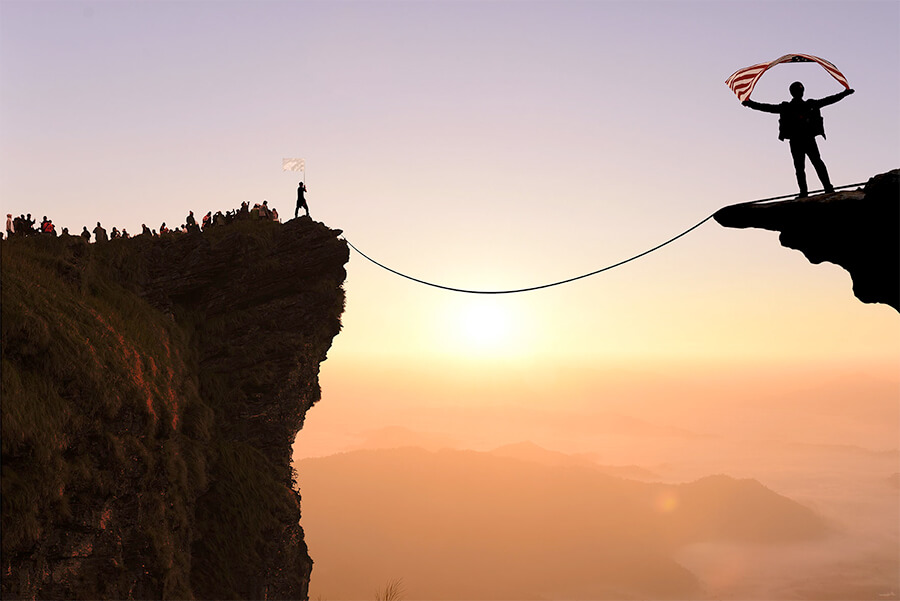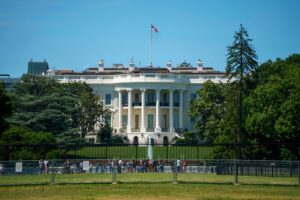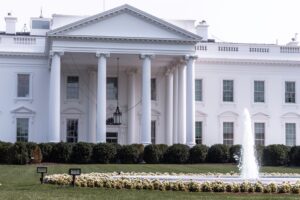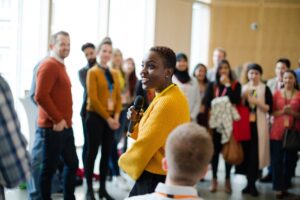RealClearPolitics
It’s a rainy, muggy day in Leesburg, Va. Although the town is 30 or so miles from the interminable partisan wrangling in Washington, D.C., it’s infected with some of the same bitter polarization—as is so much of the country. On this morning in July, I’m walking into a Veterans of Foreign Wars post that looks as if it hasn’t been refurbished since the Vietnam era, or maybe World War II. Noisy window air conditioners wheeze and struggle to keep two spartan meeting rooms at a tolerable temperature. But the atmosphere inside is electric.
Sixteen local people have gathered for a Better Angels workshop. Eight are Donald Trump supporters and Republican voters; eight supported Hillary Clinton and vote Democratic. One is a progressive transgender man still in his late teens; another is a conservative, middle-aged academic. They don’t agree on much, but they’re here to see if they can talk to each other, instead of at or about or against each other.
America has always been a partisan country, but not always as sharply as today. After liberals all sorted themselves into the Democratic Party and conservatives sorted themselves into the Republican Party, cross-party dialogue withered—in the U.S. Congress and in our country’s streets. Worse, disagreement about issues has morphed into something psychologists and political analysts call “affective polarization,” which means partisans don’t merely disagree with one another, they dislike and distrust each other. They think the other side is dishonest and dangerous. In a system designed by its founders to depend on compromise, that kind of angry tribalism is toxic to America’s capacity for self-governance.
Maybe most discouraging is the feeling that, as polarization grows, there’s nothing we can do about it, either as individuals or the country. We’re stuck in an escalating spiral of partisan animosity, or so it seems. It’s a frightful future, but what can we do?
The 16 people at VFW Post 1177 are here to disprove that fatalism. Led by William Doherty, a nationally recognized family therapist and professor at the University of Minnesota, and under the watchful eye of David Blankenhorn, Better Angels’ founder and president, participants take turns introducing themselves. Then blues and reds gather separately to brainstorm about stereotypes they think the other side holds about them. Among the reds, a whiteboard is soon cluttered with phrases such racist, homophobic, hateful, misogynistic, anti-poor, anti-Muslim, ignorant, anti-environment. The blues’ board includes anti-life, pro-dependency, unpatriotic, anti-religious, weak on defense.
Both sides present their lists to the whole group. Participants are asked to talk about what they’ve learned about how the other side sees itself. A woman in the blue group acknowledges she has held many of those anti-red stereotypes, adding that she’s sad that this is the case. Next comes a “fishbowl” exercise. One group discusses and critiques its own values while the other listens; then the roles reverse. Only after this exercise in listening, more than halfway into the workshop, do the participants finally begin to interact directly across party lines. By now, however, all feel safe to do so. All feel that they are being heard.
Better Angels sessions are not about changing anyone’s mind. Instead, they’re about building little platoons (to use the conservative philosopher Edmund Burke’s term) of people who will do the hard work of listening to one another. Modern psychology says that a good way to build solidarity among diverse people is to give them a project to do together, hands-on and face-to-face. For Braver Angels, learning to talk to—instead of past—each other is just such a project.
I am a Better Angels board member and contributor, so I’m an interested party. I’ll admit, though, that I initially had doubts that the workshop model could bring about significant change. In a huge country drenched in hyper-partisan social media and split into contending epistemic bubbles, can a handful of people in a VFW hall really matter? Workshops take hours at a minimum, and up to a couple of days. They need volunteer organizers and recruiters. Could such a labor-intensive program be scaled?
As it turns out, the program is scaling itself. Participants often find the experience of making contact with the “other” inspiring and transformative. Hundreds have raised their hands to bring the model to their own communities. The Better Angels organization is training people to be moderators—and training those moderators to train other moderators. Its goal of seeding a national grassroots movement still seems ambitious, but far from impossible.
Something else about Better Angels also scales: its message. It changes the story we tell ourselves about our agency as Americans. It shows we need not passively accept the decline of civic life into constant, grinding, low-grade partisan warfare. Polarization isn’t inevitable or automatic, after all; we can push back. I’ve seen the emotional relief and happiness people feel when they connect candidly and compassionately across party lines. I’ve seen the mental lightbulb turn on when they realize they’re not helpless.
Of course, nothing changes overnight. Our political differences are substantive and consequential, and no one pretends otherwise. No guarantees. But in America, hands-on activism like what I saw in Leesburg last summer, activism by little platoons, is how civic renewal happens, and it always starts out against long odds.
If you want to learn about Better Angels, volunteer, become a member, or help fund it, visit the website. Or check out stories in the media spanning the political spectrum. Here’s a Washington Post piece. Here’s one in the Daily Caller. And NPR did a feature story on the group earlier this month. Or see for yourself on YouTube: This is a six-minute video called “Finding Common Ground in Ohio.” There’s more than one way to make America great again, and we can help each other do it.
Jonathan Rauch, a contributing editor of National Journal and The Atlantic, is the author of several books and many articles on public policy, culture, and economics.




